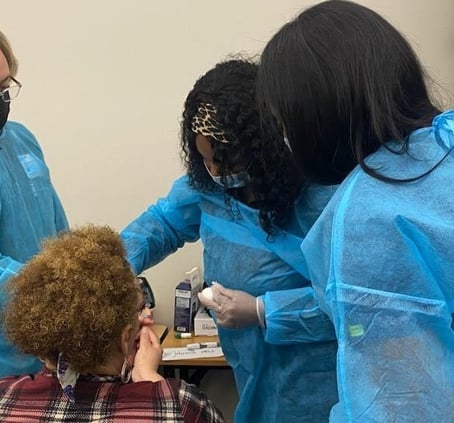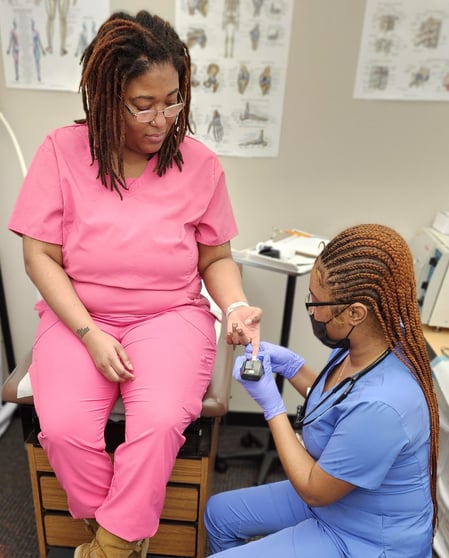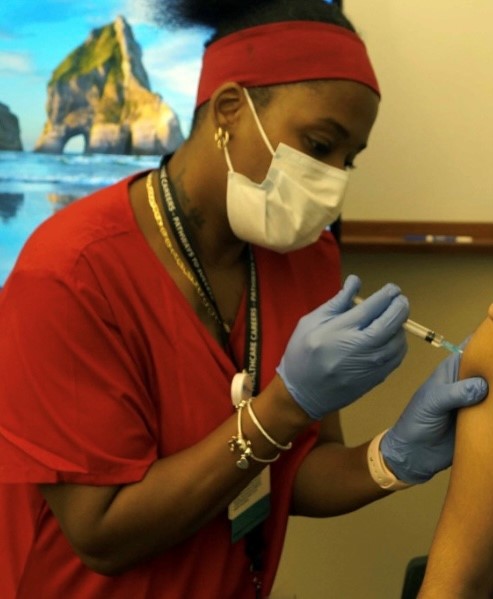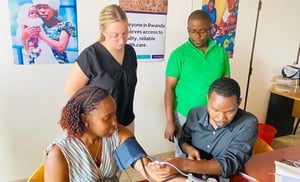How the AHW-Funded MAAPET Program is Building a Diverse Healthcare Workforce in Wisconsin
April 4, 2024 Posted by AHW Endowment
.png?width=900&name=MAAPET%20Featured%20Image%20(2).png)
The demand for medical assistants (MAs), who are critical members of medical teams supporting both nurses and physicians, is expected to grow by 14% by 2032—faster than many other occupations. However, technical and private college systems haven’t been able to keep up with that demand, and the high costs of training and lengthy educational programs can be barriers for potential students.
With $398,581 in health research grant funding from the Advancing a Healthier Wisconsin Endowment (AHW), community partners Employ Milwaukee and the Center for Healthcare Careers of Southeast Wisconsin, Inc. (CHCSE) and Medical College of Wisconsin (MCW) primary academic partner Linda Meurer, MD, MPH (Family and Community Medicine), successfully created the Medical Assistant Accelerated Pathway to Employment Training program (MAAPET), providing immediate engagement to wages and on-the-job training and increasing the number of diverse medical assistants working in ambulatory clinics across southeast Wisconsin.
Developing the MAAPET Program
With the MAAPET project, Employ Milwaukee proposed a collaboration with CHCSE, which is comprised of four major regional health system employers: Children’s Hospital of Wisconsin, Froedtert & The Medical College of Wisconsin, Advocate Aurora Health, and the Medical College of Wisconsin. Through this partnership, the MAAPET project would quickly build a diverse talent pool of MAs, expediting the length of their training, and helping to move qualified and talented MAs into the workforce, faster.

As planning for the MAAPET program began, the project team set out to accomplish the following goals:
- Meet a critical need for MAs in the healthcare workforce while eliminating barriers
- Recruit and develop an MA workforce that reflects the diversity of the community it serves
- Support low-skilled, low-income community members and entry-level incumbent workers with career opportunities that provide sustaining wages and help them succeed
- Implement an accelerated and employer-driven MA training program that efficiently increases the quality of talent
- Ensure the MAAPET program is sustainable, scalable, and adaptable to other workforce needs
Funding for the MAAPET program began during the peak of the COVID-19 pandemic in July 2020. As Employ Milwaukee’s President and CEO Chytania Brown explains, the pandemic did not keep the project from getting started.
“Starting a program during a pandemic is not recommended, but we made it work. One of our biggest challenges was hiring instructors for the training course—there is a critical shortage of healthcare educators. But we were able to find dedicated instructors that took us through this process and stayed with us…. They really gave it their all in terms of the tutoring, counseling, mentoring, and keeping the trainees going,” said Brown.

Portions of the training that were intended to be in-person were moved online as the project team and the program trainees adapted to various COVID-19 cautions and restrictions. According to CHCSE Executive Director Katherine Karshna everyone adapted well to unanticipated changes to their plans. “We had to quickly transfer classes to online learning for weeks at a time during the first three cohorts because we had COVID outbreaks within our class…. So, it was an adventure for all of us, for the instructors, for all the partners, and our trainees. But we got through it, and I think we got through it pretty well.”
Overcoming Challenges: Dedication and Community Engagement in MAAPET
The project team was impressed and proud of the dedication that program students showed in their participation in MAAPET, committing to full-time training while balancing families and home lives, often coming from entry-level positions and incomes.
“Life happens for these individuals, and in two-year programs, trainees might have to drop out and never return, or return much later if they return at all. With the accelerated program, we’re able to see more diversity entering this workforce pipeline than you would traditionally see,” said Brown.
Karshna added, “Someone might not be able to commit to two years and drop out of the workforce for that long while going to school, but they can give it their all for 10-14 weeks and finish up with a nice career at the end of it.”
The program has also provided opportunities for MCW medical students to connect with their community. According to Dr. Meurer, in the first cohort, “We were able to engage a medical student in helping to do some of the data work for the program, and she came to some of the classes to help out. Whenever there is an opportunity for our students to get involved in the community and community activities, it’s valuable for them. That student, Cheyenne Greenhouse, was able to report on her experience with MAAPET as a poster and present it locally.”
The Future of the MAAPET Program
The MAAPET program has exceeded the team’s expectations, surpassing their goal of enrolling 100 trainees, ultimately recruiting 131. By providing an accelerated training timeline, the program reduced training time for MAs by up to 85%, with 88% of students completing the 14-week program, and 94% of program graduates getting placed as MAs.
MAAPET has also proven to be a sustainable model. Though the AHW-funded project ended in 2023, MAAPET recently launched its 11th cohort, and there are currently efforts underway to explore ways to continue and expand it to other workforce needs.
Brown explained that the success of the AHW-funded project allowed for the program’s further funding and growth. “We were able to write a grant to the U.S. Department of Labor for a nursing expansion grant and continue to run cohorts of the medical assistant program. People continue to come in as MAs and this gives them a career pathway where they can go on to maybe be an LPN, RN, or something along those lines. It’s an entry point to other healthcare opportunities.”

At CHCSE, the MAAPET program has also helped to create learning opportunities for high school students who are interested in healthcare careers. With the Hands-on High School program, CHCSE brought high school students into the MAAPET classrooms for half-days where they could work beside MA students, learning about basic activities such as taking blood pressure and taking out sutures. “Getting them in the classroom and giving them a chance to have hands-on experiences with actual healthcare activities helps get them excited about healthcare career possibilities,” said Karshna.
The project team looks forward to finding more opportunities to replicate the success of the MAAPET program to support the growth of other healthcare careers. As Karshna shared, “We look at this model now and we have discussions all the time: Are there other healthcare careers we could use this model for, or how can we take this model, expand it, and continue to offer it to new individuals throughout our community? We hope can keep going and keep increasing that pool… We're always exploring how can we do this with maybe a different career area.”


.png?width=300&name=Funding%20Announcement%20(2).png)

